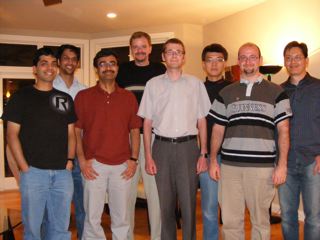
Prof. Haenggi's Research Group
University of Notre Dame
Group Members
- Anjin Guo
- Zhen Tong
- Xinchen Zhang
- Na Deng
- Prof. Haenggi
Links
Daniele Puccinelli

Education
Laurea, Università degli Studi di Pisa, 2001
M.Sc., University of Notre Dame, 2005
Ph.D., University of Notre Dame, 2008
Research Summary
My research interests lie in the challenges posed by the energy-constrained nature of wireless sensor networks.
The main goal of my research is the avoidance of a premature demise of the network given the constraints of the existing lower-end sensing node hardware. Hardware constraints such as limited computing power and limited memory are only temporary, but energy constraints are more crucial. Battery capacity, for instance, only doubles every 35 years, which means that energy-awareness will remain a distinguishing trait of protocols for wireless sensor networks. Working around the constraints of the current hardware also permits us to find solutions whose benefits will be largely boosted by the evolution of sensing node hardware. Moreover, future developments in the direction of the so-called smart dust will make it appealing to introduce devices that replicate the functionalities of today's lower-end sensing nodes on a smaller physical scale.
More specifically, I am interested in load balancing schemes. The standard use of a sensor network is data collection, which typically produces a many-to-one traffic pattern. Unfortunately, the nodes with the best channel to the base station have a heavier workload than their peers, as they are called to relay traffic that they do not generate. This additional burden curtails their lifetime, disconnecting the base station from the rest of the network and therefore making the network useless. This effect is known as the hot spot problem; it is the aim of load balancing schemes to avoid the formation of hot spots, or at least reduce the gravity of the problem.
My main research effort is geared toward the formulation, design, and implementation of a family of data collection protocols that embed load balancing at the network layer and adopt a cross-layer approach to exploit information from the physical layer.